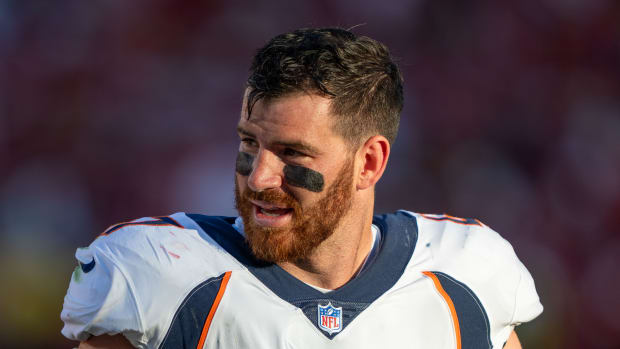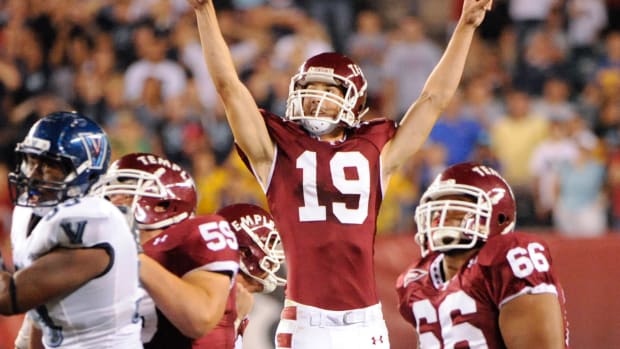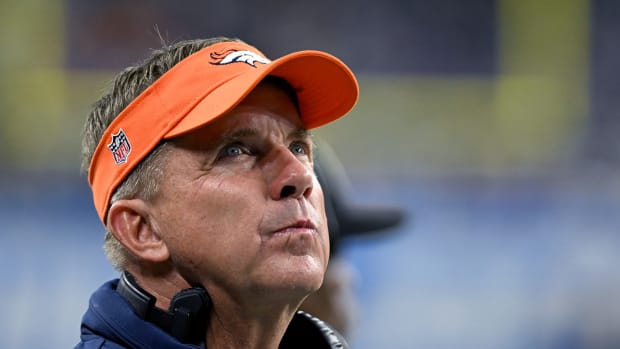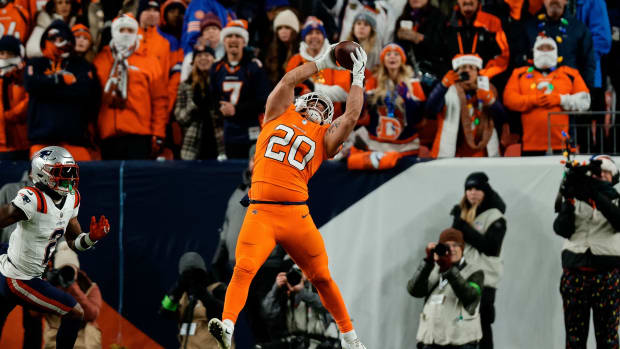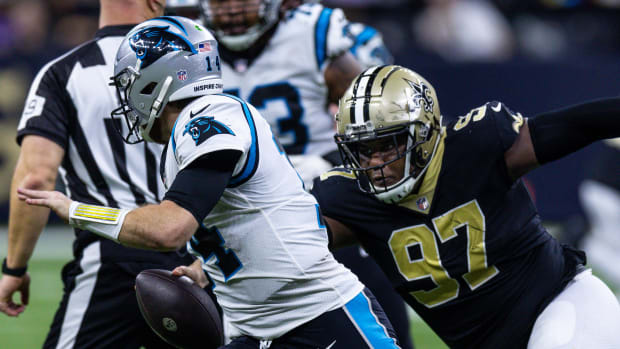Broncos' 2020 Salary Cap Implications of Ja'Wuan James' Opt-Out Revealed
The Denver Broncos have two players who have opted out of playing in 2020, under the rules for players established because of concerns about COVID-19.
The more notable of the two is right tackle JaWuan James, who cited concerns about his wife recently giving birth and a family member having been hospitalized with COVID-19.
The other one is defensive tackle Kyle Peko, whose wife was diagnosed with stage 3 Hodgkin’s lymphoma last year. Peko reportedly had concerns about her health and potentially exposing her to COVID-19.
People will have their opinions about the players themselves, but I’m focusing more on what James and Peko are really getting and what that means from a salary cap perspective. Let’s go over a few key points about the rules, which Jason Fitzgerald of Over the Cap explains in detail.
Stipend vs. Advance
First, there are two options available to players: a high-risk pool for players with an underlying health condition that puts them at higher risk for COVID-19, and a voluntary opt-out for players without health conditions.
Based on what the CBA modification states, it’s not clear if the first option is only available if the player himself is affected or if an immediate family member (a spouse or child) is affected.
Peko will get the first option because his wife falls into the high-risk category, which means he's eligible for $350,000 stipend to be paid to him as long as the season isn’t canceled before it starts (more on this point later).
If not designated higher-risk, Peko would have gotten a $150,000 advance on his salary, which was set at $990,000 for 2020. This is what players who voluntarily opt-out, but have no underlying health conditions, receive.
The $150K has been called a 'stipend' when it’s not. It’s actually an advance, meaning the player agrees to take a small portion of his 2020 salary, which either comes out of next year’s salary or is paid back to the team if he’s cut.
Think of an advance like a book advance, in which an author gets paid some money upon signing a book deal, but will not earn additional royalties until earning initial royalties equal to the advance. In other words, if an author gets a $1,000 advance, the author must sell books that earn him $1,000 in royalties before he can earn any more royalties.
Getting back to the $150K advance, it’s likely what James will be getting because he doesn’t have any reported health conditions that put him at high risk. Furthermore, a player’s wife having a baby isn’t listed as an 'at-risk' health designation under the CBA modification. Therefore, James is only getting an advance on the $10M base salary he was due in 2020.
What it Really Means for James
With both options, a player’s contract rolls over into 2021 and any future years roll over one year later. The high-risk option, though, allows a player to receive an accrued season toward free agency, while the voluntary opt-out does not.
For James, this is not really a big deal, because he has enough accrued seasons to be an unrestricted free agent when his deal expires. There’s another benefit to him taking the opt-out, but it’s important to understand how it really works.
First, James had $10M in fully guaranteed base salary in 2020, so the Broncos were going to have to pay him that money, regardless of other circumstances. What James has done is agreed to take $150K of that money this year, then get the remaining $9.85M in 2021.
However, future years of his contract will roll over, meaning the $11M in base salary, of which $5M is injury-only guaranteed, will now move to 2022. The remaining $11M in 2022 (which isn’t guaranteed) moves to 2023.
Essentially, James agreed to kick the can down the road on most of the money he was already due to receive in exchange for a tiny portion now. That’s not much consolation to Broncos fans who expected him to play this year, but he’s not getting additional money out of the opt-out.
What James is gaining is protecting that $10M in case the season is cut short. This goes back to what I referred to with Peko, but to explain: If the season is canceled before it starts, all players, regardless of whether or not they opted out, get $250,000 plus their health insurance benefit and their contracts roll over into next season.
But if the season gets cut short, players will lose out on any salary due for those games. The base salaries are paid per game played, so if James hadn’t opted out and only eight games are played, he only gets $5M.
So by opting out, James protects his $10M base salary, because it rolls over into 2021.
He’s not the only one protecting himself in this manner. CJ Mosley of the New York Jets opted out as well. Other veterans who had fully guaranteed money due in 2020 also protected themselves in this manner. It’s thus a good deal for such players if they opt-out.
What it Really Means for Peko
Peko has been placed on the Reserve/Higher-Risk Opt-Out list, which means he’ll get $350,000 for the season and will accrue a season toward free agency. It’s a good deal for him because he truly gets paid for not playing at all.
But if he weren't to get that option and was designated a voluntary opt-out, it would have been a riskier decision for him. Because the $150,000 is considered an advance, it comes out of the $990,000 base salary he was due. Thus, in 2021, he'd get $840,000.
However, Peko only would get that base salary if he makes the 53-man roster in 2021. If he fails to make the roster, he has to pay back the $150,000.
The $150,000 isn’t really a good option for players on the bubble, because it’s an advance on salary that they could risk having to pay back if they don’t make the roster next year.
It’s worth noting, there is no advance paid to either undrafted rookies or free agents who didn’t play at all in 2019. One example in the latter category is offensive guard Chance Warmack, who didn’t play in 2019, but signed with the Seattle Seahawks in free agency earlier this year, but has opted out — he’ll get no money for doing so.
Back to Peko. If he gets the high-risk option, he’s in good shape. If not, he’s taking a greater risk.
Cap Impact of James Opting Out
Let’s go back to James and consider the salary cap impact. Originally, James was to count for $13M against the cap, consisting of the $10M base salary and $3M from his prorated signing bonus.
Because he opted out for 2020, we learned on Tuesday that he literally counts for zero against the cap this season, with even the prorated portion of his original 2020 cap hit ($3.15M) being deferred until 2021. That actually creates just north of $13M in cap space, because the signing bonus that totaled $12M was already paid out from 2019 cash. (In other words, he’s not getting an additional $3M this year.)
In 2021, the $10M base salary moves to that year, minus the $150K advance (so it’s $9.85M). Add in the $3M from his prorated signing bonus and his 2021 cap charge drops from $13M to $12.85M.
The Broncos thus get about $13M in cap relief and cash savings for 2020. Though they are locked into James for 2021, it comes at a slightly reduced cap charge and less cash.
His 2021 base salary of $11M, of which $5M is injury-only guaranteed, now moves to 2022, giving him a cap charge of $14M that year.
The final year of the deal now moves to 2023, with a $2M roster bonus due March 17 and an $11M base salary. However, his pro-rated signing bonus comes off the books, so his cap charge would be $13M, with no dead money if he’s cut.
On one hand, James gains an advantage because he gets his base salary locked in, though he collects the bulk in 2021.
On the other hand, the Broncos could be more inclined to cut him in 2022 if he plays in 2021 and stays healthy. They may not have been prepared to cut him in 2021 with Garett Bolles and Elijah Wilkinson set to become unrestricted free agents.
If the Broncos do keep him, they are in an even better position to cut him in 2023, because they would incur no dead money for doing so.
Peko is more straight forward. Had he made the 53-man roster, he would count for $990K against the cap. Because he’s not playing this year, any cap hit this year will be no more than $350K.
Bottom Line
It remains to be seen whether there are any modifications in 2021, should COVID-19 remain a concern. But given the fluid nature of the situation, I won’t look too far ahead.
All you need to know is that James did benefit from the opt-outs given to players, even if he didn’t gain additional money, while it may not be that simple for Peko.
As for the Broncos, the consolation with James is they save some cash this year and will save a little next year over what they were expecting to pay. The only question to be asked in 2021 is whether or not the Broncos see that season as his last chance to prove himself.
Follow Bob on Twitter @BobMorrisSports and @MileHighHuddle.
